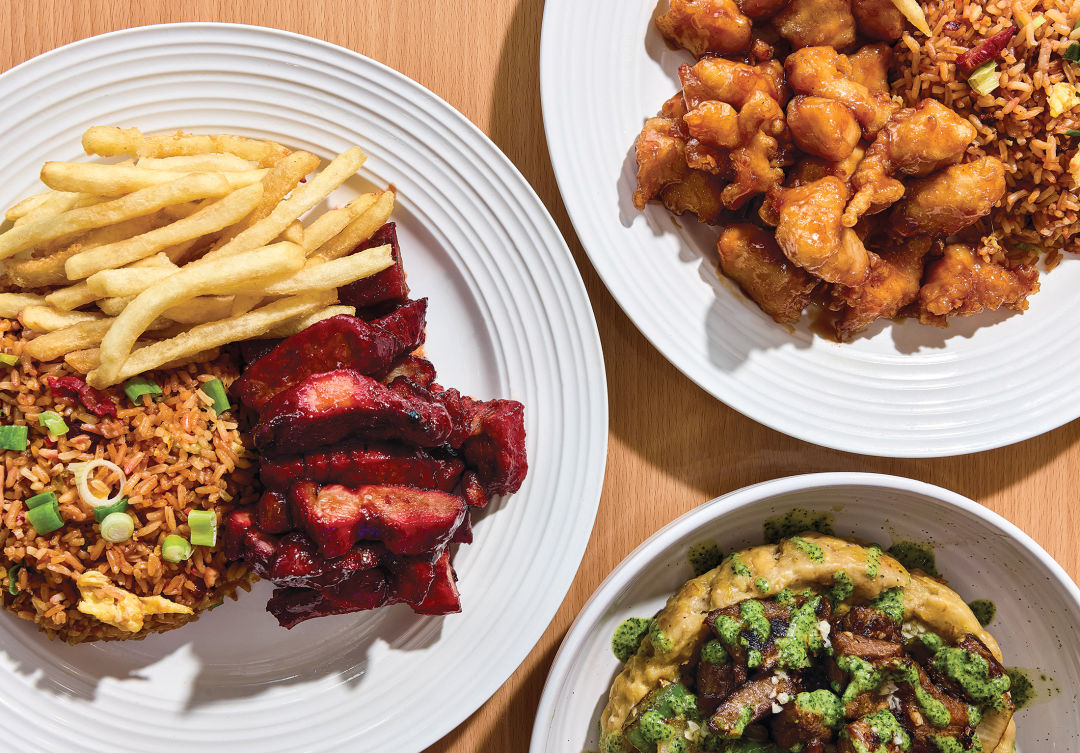Michy’s Chino Boricua Brings Puerto Rican Chinese to Houston

Image: Bethany Ochs
The term “fusion cuisine” can be somewhat reductionist, flattening the nuances and histories behind how so many culturally blended dishes come to be. They aren’t always the result of conscious experimentation or the pursuit of trendy,
TikTok-friendly new mash-ups. Many fusions originate when immigrant chefs introduce their native foods to the local palates populating their new homes, tailoring personal favorite recipes to use the most accessible ingredients while also enticing a broader customer base. Michelle Lao, owner of Michy’s Chino Boricua in Katy, feeds people the way her parents once did, using Chinese and Puerto Rican techniques and ingredients to create a hybrid cuisine crafted from geography and necessity.
Born in Panama to Chinese parents, Lao’s family moved to Puerto Rico when she was just 2 years old. She came of age in her parents’ restaurant, spending her after-school hours in the kitchen and, when she grew older, working the cash
registers. In these moments, she observed her parents lovingly injecting flavors from their Chinese heritage into the local fare. Lao gained a fondness for mofongo relleno de pepper steak (a personal favorite now on Michy’s own menu), craggy-skinned fried chicken, and carne frita served with white rice.
“Chinese dishes, especially from the Canton region, you use the wok, and you do
garlic butter, and you do shrimp or vegetables,” Lao says. Puerto Rican cuisine also includes generous amounts of garlic. Using that commonality as a starting point, Chinese chefs residing in the Caribbean experimented with incorporating local ingredients, like adobo and sofrito, into their meals.
Lao studied accounting in college and later held corporate jobs, including at Airbnb. But by 2019, after nearly a decade in San Francisco, she could no longer continue dodging her encroaching childhood dream of opening a restaurant. Her parents, who had by then moved to the Houston area, tried to discourage her with the best intentions. The food and beverage industry is notoriously punishing; they urged her to take a different path in life, something they themselves weren’t able to pursue in their youth. But Lao didn’t waver.
“Come 2019, I’m at that point where either I stop talking about owning my own restaurant, or I really sit down and I ask my parents, ‘Hey, I really want to do this. Would you help me?’” she says.
Eventually, Lao’s parents relented. She packed up and moved out to Katy, where she opened San Eatery in partnership with some of her father’s colleagues from Puerto Rico. The COVID-19 pandemic hit a month after the February 2020 opening, further compounding the challenges already inherent to owning a new restaurant. After leaving San that July, she signed a lease for her first solo culinary venture on Greenhouse Road by November. Michy’s Chino Boricua officially opened its first location in Katy in May 2021 and a second in Katy Food Hall almost three years later. The name “Michy’s” originates from Lao’s nickname; “Chino Boricua,” Spanish for “Chinese Puerto Rican,” indicates the style of cuisine.

Image: Bethany Ochs
Deeply driven and hands-on, Lao tackled the permits, scheduling construction and buildouts, and marketing herself. However, she still needed critical guidance from her parents. The couple hopped onboard, teaching their daughter the ways of the restaurant world and optimal kitchen workflow, as well as sharing their own recipes with her to use at Michy’s. Her father even chipped in behind the scenes, cooking in the kitchen.
“It’s very different to be a kid working with your parents and seeing them in their restaurants, than to actually operate it from beginning to end and understand the whole process,” Lao says.
Today, the offerings at Michy’s reflect the meals she grew up around: Chinese fast-food mainstays, including entrées and sides with Puerto Rican staples. Heaping platters of orange chicken, barbecued pork ribs, and pepper tofu are served with mounds of mofongo drizzled with garlic butter, while sizzling churrasco steak and crispy carne frita are enjoyed with fried rice or lo mein.
For Lao, the garlic butter tostones are emblematic of the culinary fusion that took root in Puerto Rico decades ago. While she still proudly serves hers with the popular Puerto Rican condiment mayoketchup (exactly what it sounds like), she continues a beloved tradition from previous generations of chefs by first tossing them in a Cantonese-style garlic butter.
“It’s something that the Chinese restaurants did [to put] a spin on the Puerto Rican dish…In Puerto Rico, everybody eats tostones, and they’ve never done them with garlic butter. Never,” Lao says. “I think it wasn’t until the Chinese people came and they saw a dish like, ‘Oh, what if we did garlic butter tossed with the tostones?’”

Image: Bethany Ochs
She also notes that, like many Latin American cuisines (particularly South American), Puerto Rican food isn’t typically spicy, but in Houston, many residents still love adding a fiery tang to their meals. To strike a balance between preserving the flavors of her childhood and keeping diners happy, Lao offers sriracha on the side.
The portions at Michy’s are also massive—one entrée with a side yields enough for three meals—and they’re presented in a leftovers-friendly Styrofoam clamshell container with plastic-wrapped utensils, befitting the restaurant’s fast-food origins. Diners have started streaming in from around Texas and beyond in pursuit of the perfect comfort meal. Lao estimates that around 80 percent of the current clientele are Puerto Rican or Venezuelan, drawn to the Chinese food they remember and love from their home countries.
“As a restaurant, sometimes you do want to innovate a little bit…but the audience that we serve now, the true Puerto Rican audience, those people are craving a piece of home,” she says.
Still, most diners are bound to find something familiar and satisfying. That’s what makes Michy’s such a singular dining experience. Lao plants the food firmly in its geographic and historic roots, making only the most minute, if any, tweaks to her parents’ recipes. It’s Chinese. It’s Puerto Rican. And it’s for everyone. Any visitor can find succor in its relaxed atmosphere. Fried dishes, rice, noodles, plantains, and sauces balancing the sweet with the savory (and maybe a touch of spice, depending on your preferences) are near-ubiquitous comfort foods without borders.
“I love the fact that [we’re] providing a space to people where they can come and they feel connected,” says Lao, who also notes that a third location is slated to open in Dallas soon. “They share a meal, they share stories, and it’s a safe environment where, if you’re thinking about gathering with your friends, [you say], ‘Oh yeah, let’s go to Michy’s.’”




